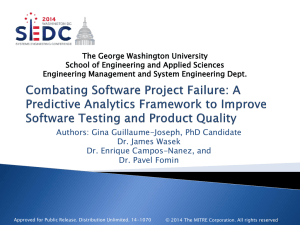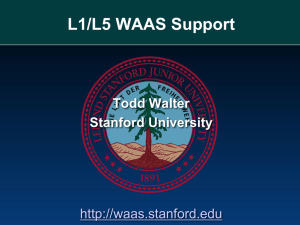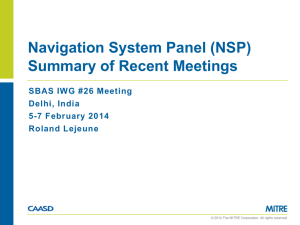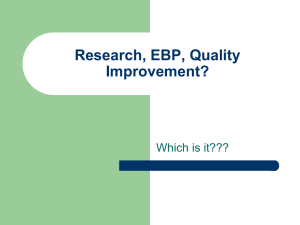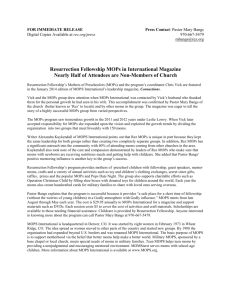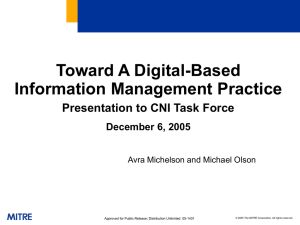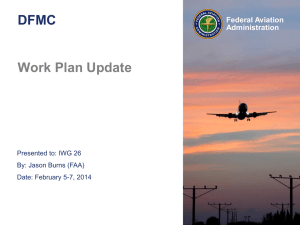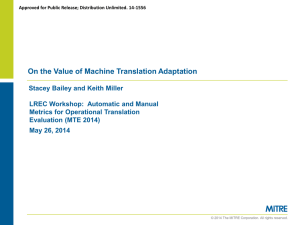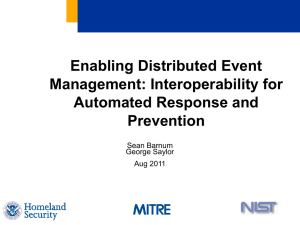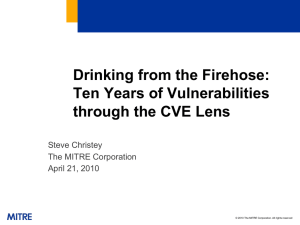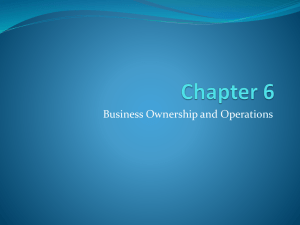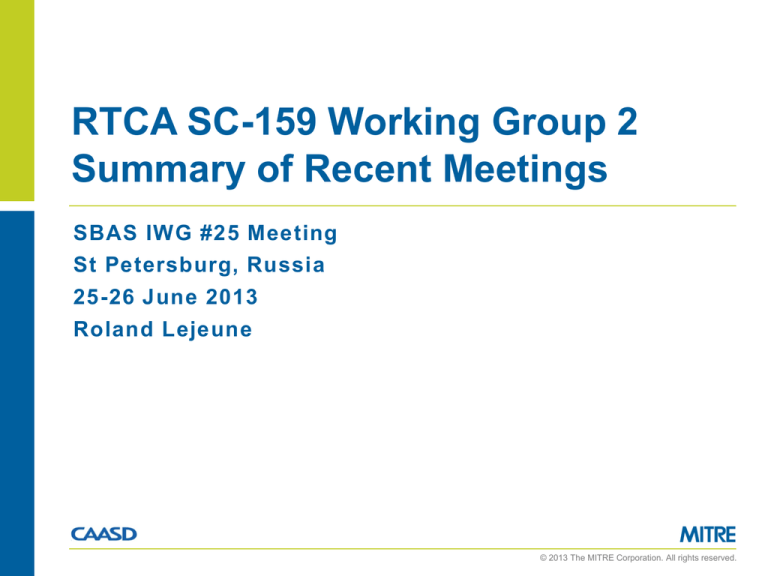
RTCA SC-159 Working Group 2
Summary of Recent Meetings
SBAS IWG #25 Meeting
St Petersburg, Russia
25-26 June 2013
Roland Lejeune
© 2013 The MITRE Corporation. All rights reserved.
|2|
Introduction
(1 of 2)
Only one RTCA SC-159 WG2 meeting since IWG/24:
– March 12-13, 2013
Main agenda items addressed by WG2 (Topics 1 & 2):
– System status updates
WAAS
EGNOS
GALILEO
– GNSS Evolution
Concept of Operation for GPS/GALILEO receiver
Information needed for development of new MOPS
Planning for GNSS evolution
© 2013 The MITRE Corporation. All rights reserved.
|3|
Introduction
(2 of 2)
Main agenda items addressed by WG2 (Topics 3 & 4):
– Single-frequency SBAS requirements
DO-229D Change 1
SARPs/MOPS harmonization
– Dual-frequency, multi-constellation (DFMC) development
DFMC Work Plan from IWG
DFMC receiver fallback modes
ARAIM development
RAIM availability of combined GPS/GLONASS receiver
© 2013 The MITRE Corporation. All rights reserved.
Topic 2: GNSS Evolution
© 2013 The MITRE Corporation. All rights reserved.
|5|
Concept of Operation for GPS/GALILEO
Receiver
Document being developed by EUROCAE
– Initial draft completed in March 2013
– Document still in an early stage, but it will be updated as more
information becomes available
– Current focus is on GPS/Galileo user equipment using RAIM for
integrity
DFMC SBAS will be included when DFMC SBAS is defined in sufficient
detail
GLONASS mandate and the development of related MOPS will be
discussed in a future update
Document will address benefits
– Technical benefits such as improved accuracy
– Operational benefits such as support for 4D operations and ADSB, and improved robustness of low RNP operations
© 2013 The MITRE Corporation. All rights reserved.
|6|
Information Needed for Development of New
MOPS
WG2 was asked to elaborate on information that is necessary
before development of new MOPS can be undertaken
– Could take the form of a list of questions for which answers are
needed to support the development of new MOPS
MOPS that include GLONASS, Galileo, or BeiDou, for ex.
– The request was made by the SC-159 Plenary during the
discussion of the Russian mandate for GLONASS or
GPS/GLONASS user equipment in October 2012
An initial list of questions was prepared by EUROCAE and
reviewed by RTCA SC-159 WG2
– The list of questions will be further revised over the next few
meetings
© 2013 The MITRE Corporation. All rights reserved.
|7|
Planning for GNSS Evolution
FAA briefing presenting the case for the development of DFMC
MOPS
– The technology is moving forward and equipment will be developed
and brought to market by some manufacturer(s)
Multi-constellation receivers are already manufactured in some States
– New issues have surfaced that must be addressed, and addressing
them will require new MOPS
Complexities related to sovereign airspace (mandates, lack of approvals)
Tolerance to transmission in adjacent frequency bands
Robustness to interference and (to extent practical) spoofing
– Commercial aviation requires a high service availability
RTCA SC-159 WG2 agreed to start working actively on DFMC MOPS
with the goal to produce a final DFMC MOPS by 2018
– Draft by 2015
© 2013 The MITRE Corporation. All rights reserved.
Topic 3: Single-frequency SBAS
requirements
© 2013 The MITRE Corporation. All rights reserved.
|9|
Change 1 to DO-229D
Change 1 to DO-229D was published in February
It is available for download from the RTCA website
http://www.rtca.org/
© 2013 The MITRE Corporation. All rights reserved.
| 10 |
SARPs/MOPS Harmonization
(1 of 2)
In October 2010, WG2 decided to perform a detailed comparison
between ICAO SARPs and RTCA MOPS (DO-229D) requirements
for SBAS
– Daniel Domey and Yi Ding from Esterline CMC Electronics
developed a cross-correlation matrix, which was reviewed at
following WG2 meetings
Two papers proposing SARPs changes were prepared to resolve
inconsistencies
– One paper addressed GEO requirements
Message Types 9/17, Crosscheck, Acquisition
– Other paper addressed 25 (mostly minor) inconsistencies
Antenna axial ratio, URA values, σtropo formula, interference thresholds,
tracking constraints,…
© 2013 The MITRE Corporation. All rights reserved.
| 11 |
SARPs/MOPS Harmonization
(2 of 2)
Proposed changes to GEO requirements
– Changes were approved by NSP at May 2012 meeting
– They will be in Amendment 89 (applicable in November 2014)
Other proposed changes
– Original version of paper was presented to NSP in May 2012 and
updated version was presented in March 2013
Disposition of changes was postponed to allow more time for service
providers to further review some of the changes and determine whether
they would have any impact on existing SBAS implementations
– Original version of paper was reviewed by SC-159 WG2 in October
2012 and updated version was provided in March 2013
No comments were received on the updated paper
– An updated version of paper will be presented at the next NSP
meeting (November 2013)
Final disposition of proposed changes should be decided at that meeting
© 2013 The MITRE Corporation. All rights reserved.
Topic 4: Dual-Frequency, MultiConstellation (DFMC) GNSS
© 2013 The MITRE Corporation. All rights reserved.
| 13 |
DFMC Work Plan
Plan developed by the SBAS IWG with following objectives
– Facilitate coordination among service providers
– Develop material that will facilitate the development of SARPs and
MOPS
Main products
– Definition Document
Concept and high-level requirements
– Various studies addressing the following questions
Operational concept
System requirements
User Interface
Notional schedule
– Projected completion: end of 2014
© 2013 The MITRE Corporation. All rights reserved.
| 14 |
DFMC Receiver Fallback Modes
Updated version of briefing presented at IWG/24 was provided to
SC159 WG2
– Time constraints only allowed an abbreviated presentation of the
material
– Review by WG2 participants was requested
No comments were received to this date
© 2013 The MITRE Corporation. All rights reserved.
| 15 |
Advanced RAIM (ARAIM) Development
Research objective: provide a worldwide LPV-200 capability
Hybrid concept: multi-constellation RAIM-like algorithm in
airborne equipment with input from integrity service message
(ISM) provided by ground infrastructure
– Ground infrastructure performs a monitoring function, but ISM is
not required to meet a tight time-to-alert like SBAS
Ground infrastructure envisioned to be much simpler than SBAS
However SBAS could also be used (with appropriate modifications)
– ARAIM must be able to detect multiple faults as well as consistent
faults
Phase I and II completed in 2012 and 2013; Phase III report
planned for early 2014 release
– It will narrow down architectures to be fully evaluated
© 2013 The MITRE Corporation. All rights reserved.
| 16 |
RAIM availability of combined GPS/GLONASS
receiver
Analysis from Stanford University
– Research examined the potential availability benefit of horizontal
guidance from RAIM algorithm that uses both GPS and GLONASS
– Algorithm used is capable of accommodating differences in
characteristics between GPS and GLONASS
Such as ranging accuracy and satellite fault rate
– Conservative assumptions were made on GLONASS
characteristics based on analysis of data of past performance
– Availability analysis revealed significant benefits from combining
GPS and GLONASS (as compared to using only GPS)
Benefits will be even greater when improved characterization of the
more recent GLONASS constellation is available
© 2013 The MITRE Corporation. All rights reserved.
| 17 |
Acronyms
ADS-B
ARAIM
DFMC
ISM
LPV
MOPS
NSP
RAIM
RNP
SARPs
SBAS
Automatic Dependent Surveillance - Broadcast
Advanced RAIM
Dual-Frequency, Multi-Constellation
Integrity Service Message
Localizer Performance with Vertical Guidance
Minimum Operational Performance Standard
Navigation System Panel
Receiver Autonomous Integrity Monitoring
Required Navigation Performance
Standards and Recommended Practices
Satellite-Based Augmentation System
© 2013 The MITRE Corporation. All rights reserved.

